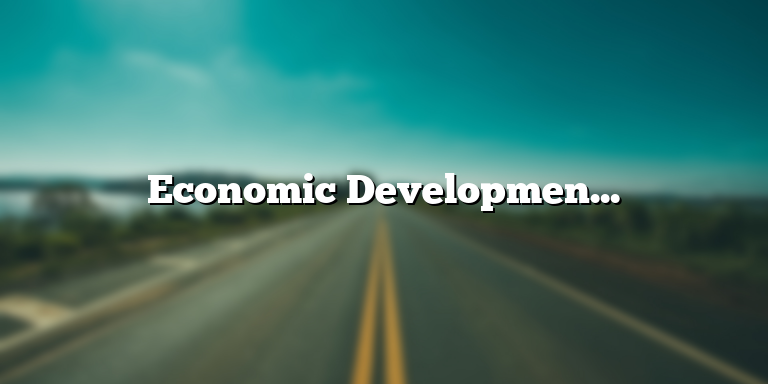
Introduction
Economic development is a foundational pillar of societal advancement, reflecting the process by which nations or communities enhance their economic, social, and institutional capacities. It encompasses improvements in productivity, income, education, infrastructure, and overall quality of life. Unlike mere economic growth—which primarily measures increases in output—economic development implies qualitative transformation, emphasizing sustainability, inclusivity, and long-term prosperity.
In today’s globalized and competitive environment, economic development not only determines a country’s economic stability but also shapes its ability to provide equitable opportunities for its citizens. The discussion below explores the meaning, importance, key factors, strategies, and challenges associated with economic development, emphasizing both its theoretical foundations and its practical implications.
The Importance of Economic Development
Economic development serves as a crucial mechanism for improving living standards and enhancing human well-being. Through job creation, income generation, and infrastructure improvement, it contributes directly to social stability and individual empowerment.
1. Enhancing Employment and Income
Job creation is at the heart of economic development. A productive economy provides citizens with opportunities to earn sustainable incomes, thereby fostering self-reliance and reducing dependency on state support. Employment also stimulates aggregate demand, further driving economic expansion through the multiplier effect. When individuals gain purchasing power, they invest more in goods, services, and education, which collectively strengthen the economic fabric of society.
2. Reducing Poverty and Promoting Equality
Economic development plays an instrumental role in alleviating poverty and reducing inequality. As more people gain access to decent work and education, wealth becomes more evenly distributed, narrowing social gaps. Moreover, inclusive development ensures that marginalized groups—such as women, rural populations, Indigenous peoples, and other underrepresented communities—can participate in and benefit from economic opportunities. This not only enhances fairness but also promotes social cohesion.
3. Improving Infrastructure and Public Services
A developing economy typically reinvests its resources in public goods such as infrastructure, healthcare, and education. Well-developed infrastructure facilitates trade, enhances connectivity, and supports industrialization. Meanwhile, better healthcare and education systems cultivate a healthier, more skilled workforce capable of sustaining economic momentum. Hence, economic development and public welfare are mutually reinforcing dimensions of progress.
Sustainable Economic Development
While rapid economic growth can deliver short-term gains, it may also cause long-term harm if achieved at the expense of environmental sustainability. Sustainable economic development emphasizes growth that meets present needs without compromising the ability of future generations to meet theirs.
This approach involves integrating environmental stewardship with economic planning. It requires investment in renewable energy, efficient use of natural resources, and innovations that minimize waste and pollution. Sustainable development also aligns with global frameworks such as the United Nations Sustainable Development Goals (SDGs), particularly Goal 8 (Decent Work and Economic Growth) and Goal 13 (Climate Action).
Adopting sustainable practices not only preserves ecological balance but also enhances economic resilience, ensuring that prosperity is both inclusive and enduring.
Types of Economic Development
Economic development manifests in various forms, reflecting diverse policy priorities and social contexts. Generally, it can be classified into three interrelated types:
- Business Development – Focused on fostering entrepreneurship, attracting investment, and creating a conducive environment for private enterprise.
- Community Development – Aimed at improving living standards through infrastructure, housing, and local services, strengthening the social and cultural fabric of communities.
- Economic Empowerment – Dedicated to ensuring equitable access to resources and opportunities for historically marginalized groups.
These three dimensions collectively drive comprehensive and sustainable progress. Business expansion fuels productivity; community investment enhances social well-being; and empowerment initiatives ensure inclusivity.
Factors Affecting Economic Development
Several structural and institutional factors shape a country’s economic trajectory. Among the most significant are:
1. Government Policy
Effective governance is indispensable for economic growth. Policies that promote transparency, innovation, and entrepreneurship can stimulate productivity and attract foreign investment. Conversely, excessive bureaucracy and corruption hinder development. Fiscal policies that support infrastructure and education investment are particularly vital for long-term progress.
2. Natural Resources
Countries endowed with abundant natural resources—such as oil, minerals, or fertile land—often enjoy an advantage in development. However, without proper management, this advantage can turn into a “resource curse.” Effective governance ensures that resource wealth is reinvested into human capital and infrastructure rather than lost to inefficiency or corruption.
3. Infrastructure and Technology
Modern infrastructure and technological advancement are vital for connectivity, innovation, and competitiveness. Investments in digitalization, transportation, and energy efficiency increase productivity and expand market access. Technology also facilitates knowledge transfer and global integration.
4. Education and Human Capital
A well-educated population forms the cornerstone of sustainable development. Human capital development through education, training, and healthcare enhances productivity and adaptability in an evolving global economy. Nations that prioritize human capital tend to exhibit stronger, more inclusive economic performance.
Measuring Economic Development
Measuring economic development requires a multidimensional approach that extends beyond GDP. Key indicators include:
- Gross Domestic Product (GDP): Measures overall economic output but does not reflect income distribution or social welfare.
- Employment Rate: Indicates labor market health and job availability.
- Poverty Rate: Reveals income disparities and access to essential goods and services.
- Human Development Index (HDI): A composite measure combining education, life expectancy, and income, providing a more holistic assessment of human well-being.
Together, these metrics offer a comprehensive view of a nation’s developmental status and guide policymakers in evaluating progress.
Strategies for Promoting Economic Development
Economic development can be accelerated through well-designed strategies such as:
- Investment Incentives: Offering tax breaks, grants, or low-interest loans to attract businesses.
- Workforce Development: Expanding vocational training and higher education to meet market demands.
- Infrastructure Investment: Upgrading transport, energy, and digital networks to support business activity.
- Innovation Promotion: Encouraging research and development to create new industries and job opportunities.
- Public-Private Partnerships (PPPs): Combining public resources with private expertise for mutually beneficial development projects.
- Small Business Support: Providing incubators and financing to nurture entrepreneurship and local job creation.
Together, these approaches foster an ecosystem of sustainable economic dynamism.
Challenges in Economic Development
Despite its importance, economic development faces numerous obstacles, including limited access to capital, skill shortages, technological gaps, political instability, and climate change. Developing countries, in particular, struggle with insufficient financial systems, corruption, and inadequate infrastructure. Moreover, global economic volatility and environmental degradation further complicate long-term planning.
Addressing these challenges requires a comprehensive strategy grounded in institutional reform, international cooperation, and sustainable policy design.
Conclusion
Economic development is far more than an economic metric—it is a multidimensional process that determines the social, cultural, and moral health of a nation. Through employment creation, poverty reduction, infrastructure improvement, and environmental stewardship, it lays the foundation for human flourishing. Sustainable and inclusive development, supported by sound governance and responsible policy, remains the key to ensuring that progress benefits all members of society—both now and in the generations to come.

